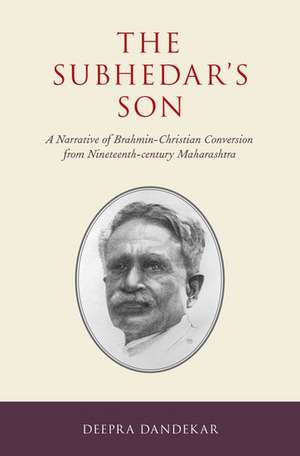The Subhedar's Son: A Narrative of Brahmin-Christian Conversion from Nineteenth-century Maharashtra: AAR Religion in Translation
Deepra Dandekaren Limba Engleză Hardback – 21 feb 2019
Preț: 545.83 lei
Preț vechi: 782.27 lei
-30% Nou
Puncte Express: 819
Preț estimativ în valută:
104.45€ • 108.39$ • 87.31£
104.45€ • 108.39$ • 87.31£
Carte disponibilă
Livrare economică 11-17 februarie
Preluare comenzi: 021 569.72.76
Specificații
ISBN-13: 9780190914042
ISBN-10: 0190914041
Pagini: 268
Dimensiuni: 236 x 165 x 28 mm
Greutate: 0.52 kg
Editura: Oxford University Press
Colecția OUP USA
Seria AAR Religion in Translation
Locul publicării:New York, United States
ISBN-10: 0190914041
Pagini: 268
Dimensiuni: 236 x 165 x 28 mm
Greutate: 0.52 kg
Editura: Oxford University Press
Colecția OUP USA
Seria AAR Religion in Translation
Locul publicării:New York, United States
Recenzii
Subhedar's Son is a fascinating portrayal of religious conversion to Christianity by a second-generation Indian Christian leader, and Deepra Dandekar's meditations on this historical novel greatly increase our knowledge and understanding of Indian Protestants during the British imperial era.
The Subhedar's Son is, indeed, an unusual but also an unusually refreshing book. So many fascinating themes emerge from Dandekar's investigation of Shankar Nana's life. While Dandekar explicitly and clearly highlights many of these themes, others she merely hints at, or leaves whispering from the margins, inviting the reader to continue contemplating long after completing the book.
In this book, the author draws her observations about Brahmin conversion from a larger literary corpus whose contours she mediates to the reader. In the process, we gain access to valuable perspectives on a community of converts that is often overlooked in the study of Indian Christianity. The book's provocative questions make an important intervention in studies of religious conversion in India.
The Subhedar's Son is, indeed, an unusual but also an unusually refreshing book. So many fascinating themes emerge from Dandekar's investigation of Shankar Nana's life. While Dandekar explicitly and clearly highlights many of these themes, others she merely hints at, or leaves whispering from the margins, inviting the reader to continue contemplating long after completing the book.
In this book, the author draws her observations about Brahmin conversion from a larger literary corpus whose contours she mediates to the reader. In the process, we gain access to valuable perspectives on a community of converts that is often overlooked in the study of Indian Christianity. The book's provocative questions make an important intervention in studies of religious conversion in India.
Notă biografică
Deepra Dandekar completed her training in history, anthropology and archaeology at Delhi University (St. Stephen's College) and Deccan College, Pune. Subsequently, she trained as an internee at various Non-Governmental Organizations in Pune on research projects concerning gender, religion and health. She has researched and published on women's health rituals, and the religious expression of political minorities in Maharashtra at the South Asia Institute and the Cluster for Excellence, University of Heidelberg. She is currently working on the research project on migration and exclusion at the Max Planck Institute of Human Development, Berlin.








